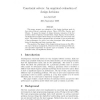Free Online Productivity Tools
i2Speak
i2Symbol
i2OCR
iTex2Img
iWeb2Print
iWeb2Shot
i2Type
iPdf2Split
iPdf2Merge
i2Bopomofo
i2Arabic
i2Style
i2Image
i2PDF
iLatex2Rtf
Sci2ools
134
click to vote
CORR
2010
Springer
2010
Springer
Constraint solvers: An empirical evaluation of design decisions
This paper presents an evaluation of the design decisions made in four state-of-the-art constraint solvers; Choco, ECLiPSe, Gecode, and Minion. To assess the impact of design decisions, instances of the five problem classes n-Queens, Golomb Ruler, Magic Square, Social Golfers, and Balanced Incomplete Block Design are modelled and solved with each solver. The results of the experiments are not meant to give an indication of the performance of a solver, but rather investigate what influence the choice of algorithms and data structures has. The analysis of the impact of the design decisions focuses on the different ways of memory management, behaviour with increasing problem size, and specialised algorithms for specific types of variables. It also briefly considers other, less significant decisions.
CORR 2010 | Design Decisions | Education | Problem Classes N-Queens | State-of-the-art Constraint Solvers |
Related Content
| Added | 09 Dec 2010 |
| Updated | 09 Dec 2010 |
| Type | Journal |
| Year | 2010 |
| Where | CORR |
| Authors | Lars Kotthoff |
Comments (0)

